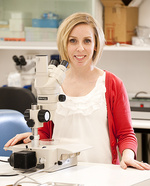Investigator's fertility breakthrough for female cancer patients
 Health Science Health Science
University of Adelaide reproductive health researcher Dr Kylie Dunning has been named the 2010 Young Investigator Award winner for her work to help preserve the fertility of female cancer survivors. Dr Dunning, a postdoctoral researcher from the Robinson Institute and the Discipline of Obstetrics and Gynaecology at the University of Adelaide, examined the role of fat metabolism in the growth and development of ovarian tissue in the laboratory. "Major advances in medical research have led to improved cancer therapies and increased survival rates in patients, but the use of life-saving chemotherapy and radiation therapy often leads to infertility," Dr Dunning said. "In Australia, girls as young as 13 years old affected by cancer can have a portion of their ovaries cryopreserved for future use. What we've discovered may increase the chances of these women starting a family later in life. "The latest technology for female fertility preservation involves growing ovarian tissue in a three-dimensional ball of gel in the lab, enabling eggs to grow and develop surrounded by their support cells, known collectively as the follicle." This technology enables the growth of eggs in the laboratory that can then be fertilised and form embryos as in traditional IVF. In the future, these embryos could be returned to the womb to form a pregnancy and a healthy baby. By using this technology it avoids having to put back the cryopreserved ovarian tissue, which may contain cancer cells. Dr Dunning said the use of 3-D follicle growth was extremely promising, however the growth of eggs capable of forming a healthy embryo and a baby required further development. "I've found that fats are a vital energy source for follicle and egg development. In fact, we've discovered that increasing the follicle and egg's utilisation of fat during 3-D follicle growth significantly improves subsequent embryo development," Dr Dunning said. The Young Investigator Award, now in its 11th year, rewards scientific excellence in South Australia's young researchers and their ability to communicate and "sell" that science. As winner, Dr Dunning received The Hon. Carolyn Pickles Award of $10,000. Prizes of $3000 each were awarded to the two runners up, Chantelle McIntyre and Zlatko Kopecki, who are both PhD candidates from the School of Paediatrics and Reproductive Health at the University of Adelaide. Chantelle is investigating replacing defective genes to prevent brain deterioration in children with Sanfilippo Syndrome, a rare inherited disease where the body cannot metabolise sugar. Zlatko is researching the role of a specific protein involved in genetic blister formation in fragile skin disorders, looking at reducing its levels to improve wound healing. The award is an initiative of the Children, Youth and Women's Health Service and the Faculty of Health Sciences at the University of Adelaide. The University of South Australia and Flinders University are also partners in the award, together with the Women's and Children's Health Research Institute and the Women's and Children's Hospital Foundation. Story by Candy Gibson
|





